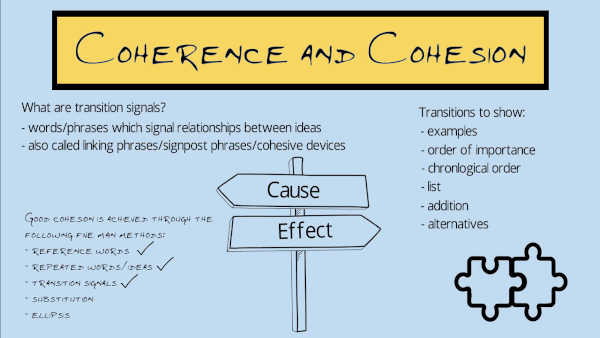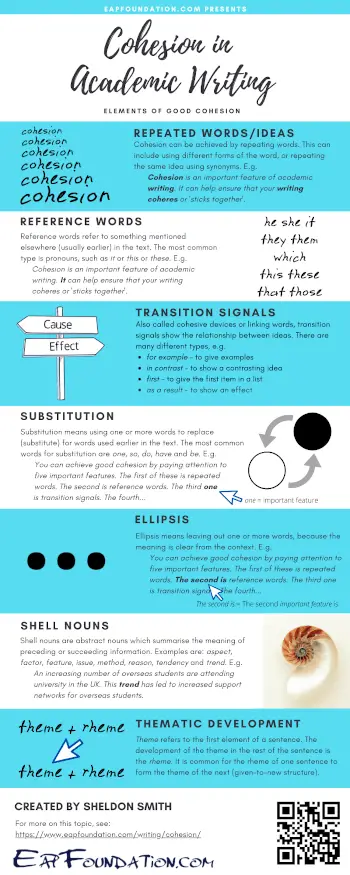Show AWL words on this page.
Show sorted lists of these words.


 







|
 Podcast is loading. Problems? Too slow? You can also access the Podcast by
clicking here.
Podcast is loading. Problems? Too slow? You can also access the Podcast by
clicking here.This message will disappear when then podcast has fully loaded.
Cohesion and coherence are important features of academic writing. They are one of the features tested in exams of academic English, including the IELTS test and the TOEFL test. This page gives information on what cohesion is and how to achieve good cohesion. It also explains the difference between cohesion and coherence, and how to achieve good coherence. There is also an example essay to highlight the main features of cohesion mentioned in this section, as well as some exercises to help you practise.
What is cohesion?
It is important for the parts of a written text to be connected together. Another word for this is cohesion. This word comes from the verb cohere, which means 'to stick together'. Cohesion is therefore related to ensuring that the words and sentences you use stick together.
Good cohesion is achieved through the following five main methods, each of which is described in more detail below:
Two other ways in which cohesion is achieved in a text, which are covered less frequently in academic English courses, are shell nouns and thematic development. These are also considered below.
Repeated words/ideas
One way to achieve cohesion is to repeat words, or to repeat ideas using different words (synonyms). Study the following example. Repeated words (or synonyms) are shown in bold.
Cohesion is an important feature of academic writing. It can help ensure that your writing coheres or 'sticks together', which will make it easier for the reader to follow the main ideas in your essay or report. You can achieve good cohesion by paying attention to five important features. The first of these is repeated words. The second key feature is reference words. The third one is transition signals. The fourth is substitution. The final important aspect is ellipsis.
In this example, the word cohesion is used several times, including as a verb (coheres). It is important, in academic writing, to avoid too much repetition, so using different word forms or synonyms is common. The word writing is also used several times, including the phrase essay or report, which is a synonym for writing. The words important features are also repeated, again using synonyms: key feature, important aspect.
Reference words
Reference words are words which are used to refer to something which is mentioned elsewhere in the text, usually in a preceding sentence. The most common type is pronouns, such as 'it' or 'this' or 'these'. Study the previous example again. This time, the reference words are shown in bold.
Cohesion is an important feature of academic writing. It can help ensure that your writing coheres or 'sticks together', which will make it easier for the reader to follow the main ideas in your essay or report. You can achieve good cohesion by paying attention to five important features. The first of these is repeated words. The second key feature is reference words. The third one is transition signals. The fourth is substitution. The final important aspect is ellipsis.
The words it, which and these are reference words. The first two of these, it and which, both refer to 'cohesion' used in the preceding sentence. The final example, these, refers to 'important features', again used in the sentence that precedes it.
Transition signals
Transition signals, also called cohesive devices or linking words, are words or phrases which show the relationship between ideas. There are many different types, the most common of which are explained in the next section on transition signals. Some examples of transition signals are:
- for example - used to give examples
- in contrast - used to show a contrasting or opposite idea
- first - used to show the first item in a list
- as a result - used to show a result or effect
Study the previous example again. This time, the transition signals are shown in bold. Here the transition signals simply give a list, relating to the five important features: first, second, third, fourth, and final.
Cohesion is an important feature of academic writing. It can help ensure that your writing coheres or 'sticks together', which will make it easier for the reader to follow the main ideas in your essay or report. You can achieve good cohesion by paying attention to five important features. The first of these is repeated words. The second key feature is reference words. The third one is transition signals. The fourth is substitution. The final important aspect is ellipsis.
Substitution
Substitution means using one or more words to replace (substitute) for one or more words used earlier in the text. Grammatically, it is similar to reference words, the main difference being that substitution is usually limited to the clause which follows the word(s) being substituted, whereas reference words can refer to something far back in the text. The most common words used for substitution are one, so, and auxiliary verbs such as do, have and be. The following is an example.
- Drinking alcohol before driving is illegal in many countries, since doing so can seriously impair one's ability to drive safely.
In this sentence, the phrase 'doing so' substitutes for the phrase 'drinking alcohol before driving' which appears at the beginning of the sentence.
Below is the example used throughout this section. There is just one example of substitution: the word one, which substitutes for the phrase 'important features'.
Cohesion is an important feature of academic writing. It can help ensure that your writing coheres or 'sticks together', which will make it easier for the reader to follow the main ideas in your essay or report. You can achieve good cohesion by paying attention to five important features. The first of these is repeated words. The second key feature is reference words. The third one is transition signals. The fourth is substitution. The final important aspect is ellipsis.
Ellipsis
Ellipsis means leaving out one or more words, because the meaning is clear from the context. Ellipsis is sometimes called substitution by zero, since essentially one or more words are substituted with no word taking their place.
Below is the example passage again. There is one example of ellipsis: the phrase 'The fourth is', which means 'The fourth [important feature] is', so the words 'important feature' have been omitted.
Cohesion is an important feature of academic writing. It can help ensure that your writing coheres or 'sticks together', which will make it easier for the reader to follow the main ideas in your essay or report. You can achieve good cohesion by paying attention to five important features. The first of these is repeated words. The second key feature is reference words. The third one is transition signals. The fourth is substitution. The final important aspect is ellipsis.
Shell nouns
Shell nouns are abstract nouns which summarise the meaning of preceding or succeeding information. This summarising helps to generate cohesion. Shell nouns may also be called carrier nouns, signalling nouns, or anaphoric nouns. Examples are: approach, aspect, category, challenge, change, characteristics, class, difficulty, effect, event, fact, factor, feature, form, issue, manner, method, problem, process, purpose, reason, result, stage, subject, system, task, tendency, trend, and type. They are often used with pronouns 'this', 'these', 'that' or 'those', or with the definite article 'the'. For example:
- Virus transmission can be reduced via frequent washing of hands, use of face masks, and isolation of infected individuals. These methods, however, are not completely effective and transmission may still occur, especially among health workers who have close contact with infected individuals.
- An increasing number of overseas students are attending university in the UK. This trend has led to increased support networks for overseas students.
In the example passage used throughout this section, the word features serves as a shell noun, summarising the information later in the passage.
Cohesion is an important feature of academic writing. It can help ensure that your writing coheres or 'sticks together', which will make it easier for the reader to follow the main ideas in your essay or report. You can achieve good cohesion by paying attention to five important features. The first of these is repeated words. The second key feature is reference words. The third one is transition signals. The fourth is substitution. The final important aspect is ellipsis.
Thematic development
Cohesion can also be achieved by thematic development. The term theme refers to the first element of a sentence or clause. The development of the theme in the rest of the sentence is called the rheme. It is common for the rheme of one sentence to form the theme of the next sentence; this type of organisation is often referred to as given-to-new structure, and helps to make writing cohere.
Consider the following short passage, which is an extension of the first example above.
- Virus transmission can be reduced via frequent washing of hands, use of face masks, and isolation of infected individuals. These methods, however, are not completely effective and transmission may still occur, especially among health workers who have close contact with infected individuals. It is important for such health workers to pay particular attention to transmission methods and undergo regular screening.
Here we have the following pattern:
- Virus transmission [theme]
- can be reduced via frequent washing of hands, use of face masks, and isolation of infected individuals [rheme]
- These methods [theme = rheme of preceding sentence]
- are not completely effective and transmission may still occur, especially among health workers who have close contact with infected individuals [rheme]
- health workers [theme, contained in rheme of preceding sentence]
- [need to] to pay particular attention to transmission methods and undergo regular screening [rheme]
Cohesion vs. coherence
The words 'cohesion' and 'coherence' are often used together with a similar meaning, which relates to how a text joins together to make a unified whole. Although they are similar, they are not the same. Cohesion relates to the micro level of the text, i.e. the words and sentences and how they join together. Coherence, in contrast, relates to the organisation and connection of ideas and whether they can be understood by the reader, and as such is concerned with the macro level features of a text, such as topic sentences, thesis statement, the summary in the concluding paragraph (dealt with in the essay structure section), and other 'bigger' features including headings such as those used in reports.
Coherence can be improved by using an outline before writing (or a reverse outline, which is an outline written after the writing is finished), to check that the ideas are logical and well organised. Asking a peer to check the writing to see if it makes sense, i.e. peer feedback, is another way to help improve coherence in your writing.
Example essay
Below is an example essay. It is the one used in the persuasion essay section. Click on the different areas (in the shaded boxes to the right) to highlight the different cohesive aspects in this essay, i.e. repeated words/ideas, reference words, transition signals, substitution and ellipsis.
Title: Consider whether human activity has made the world a better place.
Repeated words/ideas |
Reference words |
|
Transition signals |
||
Substitution |
||
Ellipsis |
History shows that human beings have come a long way from where
they started.
They have developed new
technologies which means that everybody can enjoy luxuries
they never previously imagined.
However, the
technologies that are temporarily making this
world a better
place to live could well prove to be an ultimate disaster
due to, among other things, the
creation of nuclear weapons,
increasing pollution, and
loss of animal species.
The biggest threat to
the earth caused by modern
human activity comes from
the creation of nuclear weapons.
Although it cannot be denied that countries have to
defend themselves, the kind of
weapons that some of
them currently possess are far in excess of what is needed for
defence.
If these
weapons were used,
they could lead to the
destruction of the entire
planet.
Another
harm caused by
human activity to this
earth is
pollution. People have become reliant
on modern technology,
which
can have adverse effects on the
environment.
For example, reliance on cars causes air and
noise
pollution. Even seemingly innocent devices,
such as computers and mobile phones, use electricity, most of
which
is produced from coal-burning power stations,
which
further adds to
environmental pollution.
If we do not curb our direct and indirect use of fossil fuels, the
harm to the
environment
may be catastrophic.
Animals are an important feature of this
earth and the past decades have witnessed the
extinction of a considerable number of
animal species.
This
is the consequence of human encroachment on wildlife habitats,
for example
deforestation to expand cities. Some may argue that such
loss of species is
natural and has occurred throughout
earth's history.
However, the current rate of
species loss far exceeds normal
levels, and is threatening to become
a mass extinction event.
In summary, there is no doubt that current
human activities
such as the
creation of nuclear weapons,
pollution,
and destruction of wildlife, are
harmful to the
earth. It is important
for us to see not only the short-term
effects of our actions, but
their long-term
ones as well.
Otherwise,
human activities will be just another step towards
destruction.
Repeated words/ideas |
Reference words |
Transition signals |
Substitution |
Ellipsis |
References
Aktas, R.N. and Cortes, V. (2008), 'Shell nouns as cohesive devices in published and ESL student writing', Journal of English for Academic Purposes, 7 (2008) 3-14.
Alexander, O., Argent, S. and Spencer, J. (2008) EAP Essentials: A teacher's guide to principles and practice. Reading: Garnet Publishing Ltd.
Gray, B. (2010) 'On the use of demonstrative pronouns and determiners as cohesive devices: A focus on sentence-initial this/these in academic prose', Journal of English for Academic Purposes, 9 (2010) 167-183.
Halliday, M. A. K., and Hasan, R. (1976). Cohesion in English. London: Longman.
Hinkel, E. (2004). Teaching Academic ESL Writing: Practical Techniques in Vocabulary and Grammar. Mahwah: Lawrence Erlbaum Associates Inc Publishers.
Hyland, K. (2006) English for Academic Purposes: An advanced resource book. Abingdon: Routledge.
Thornbury, S. (2005) Beyond the Sentence: Introducing discourse analysis. Oxford: Macmillan Education.
Checklist
Below is a checklist for essay cohesion and coherence. Use it to check your own writing, or get a peer (another student) to help you.
| Item | OK? | Comment |
| There is good use of repeated words/ideas (including synonyms). | ||
| There is good use of reference words (e.g. 'it', 'this', 'these'). | ||
| There is good use of transition signals (e.g. 'for example', 'in contrast'). | ||
| Substitution is used, where appropriate. | ||
| Ellipsis is used, if necessary. | ||
| Other aspects of cohesion are used appropriately, i.e. shell nouns (e.g. 'effect', 'trend') and thematic development | ||
| There is good coherence via the thesis statement, topic sentences and summary. |
Next section
Find out more about transition signals in the next section.
Previous section
Go back to the previous section about paraphrasing.
Exercises & Activities Some ways to practise this area of EAP
You need to login to view the exercises. If you do not already have an account, you can register for free.








